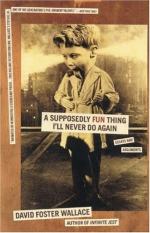|
This section contains 673 words (approx. 2 pages at 400 words per page) |

|
A Supposedly Fun Thing I'll Never Do Again: Essays and Arguments Summary & Study Guide Description
A Supposedly Fun Thing I'll Never Do Again: Essays and Arguments Summary & Study Guide includes comprehensive information and analysis to help you understand the book. This study guide contains the following sections:
This detailed literature summary also contains Topics for Discussion and a Free Quiz on A Supposedly Fun Thing I'll Never Do Again: Essays and Arguments by David Foster Wallace.
This book is a collection of essays by David Foster Wallace written between 1992 and 1996. These essays cover a wide range of topics from tennis to film and literature and even a luxury cruise in the lengthy titular essay.
The first essay details Wallace's career as a junior tennis player. Wallace explains that he was a very good tennis player when he was young because he could take advantage of the geometry of the court and the strange irregularities of playing in Illinois. Wallace plays well by simply returning his opponent's volleys until the opponent makes a mistake or has an emotional breakdown on the court. Wallace finds this method of play successful until his opponents develop much faster than him physically and are able to simply overpower him.
The second essay is a criticism of contemporary television and postmodern fiction. Wallace believes that television is not inherently bad, but people watch it too much, and it is too self-referential. Wallace relates television self-referential quality to the meta-fiction on the 1960s. Wallace argues that television relies heavily on an irony that forces viewers to watch continuously so they can always be in on the joke instead of the butt of it. It is nearly impossible to attack this irony because it can simply insult the attacker. Wallace thinks that the only way to unseat this irony is for artists to be willing to risk authentic feelings.
In the third essay, Wallace is commissioned to attend the Illinois State Fair and write about the experience. Wallace argues that people in rural areas like Illinois take vacations to be with other people while people in cities vacation to get away from people. Thus the fair is about the state as a kind of large community. However, Wallace discovers that the fair itself is divided into different sorts of communities such as the as the agriculture professionals and people who come for the carnival rides. Wallace further argues that ultimately the fair is all about food at some level or another, which is fitting for Illinois as its economy is based around agriculture.
In the fourth essay, Wallace discusses the literary criticism of H. L. Hix, who tries to save the notion of the author from poststructuralist critics.
The fifth essay previews David Lynch's new film "Lost Highway" and contextualizes it with Lynch's other work. Wallace summarizes "Lost Highway's" convoluted plot and describes the few scenes he saw being filmed. Wallace explains that what makes a work "Lynchian" is the constant presence of the macabre in the mundane. Wallace argues that Lynch's films are so emotionally effective because they implicate the audience in the evil that they witness on screen.
The sixth essay is a biographical piece on professional tennis player Michael Joyce. Wallace goes to watch Joyce at the Canadian Open and is overwhelmed by how much better all the professionals are than he had imagined. Joyce himself plays a "power-baseline" style of tennis in the tradition of Andre Agassi. Wallace argues that like many other professional athletes, Joyce has forsaken all other paths in life to play a game that he loves. In many ways that choice was made long ago and it may have never been Joyce's choice at all.
The last essay details Wallace's experience on a seven day luxury Caribbean cruise. Although the cruise is meant to be a form of relaxation, Wallace discovers that it fills him with despair. Wallace analogizes the pampering given to cruise passengers to the care given by a mother to her infant, so in many ways a cruise is a way for adults to revert to the status of children. Wallace also quickly grows accustomed to the level of luxury of the ship and finds that he only desires more because there is no way to satisfy the childish impulse to want everything. Wallace concludes that people go on cruises but do not feel that they deserve such treatment and so in some way resent the people who give it to them.
Read more from the Study Guide
|
This section contains 673 words (approx. 2 pages at 400 words per page) |

|



